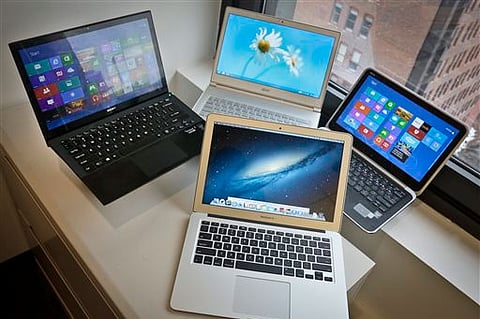Govt to make import licenses more accessible ahead of ban on import of PCs, laptops
NEW DELHI: The commerce ministry's arm DGFT is working on formulating criteria to provide licences in a smooth way to importers of laptops and computers, an official said. From Nov 1, the import of these devices would require a license.
"We are working on the licensing issues. The aim is to make it smooth to get a license for imports," the official said.
In similar cases earlier, criteria like the past performance of a company have been used for granting licences. The import curbs will help India to keep a close watch on the locations from where the products are coming.
The decision will also spur domestic manufacturing at a time when India has identified electronics manufacturing as a key priority area for its future growth ambitions and is hoping to attract investments from global biggies looking to diversify their operations outside China.
The PLI (production-linked incentive) scheme for IT hardware has attracted 38 companies, including Foxconn Group, HP, Dell and Lenovo. They have applied for incentives under the scheme for manufacturing laptops, PCs and servers.
Think tank Global Trade Research Initiative (GTRI) has stated that the government should announce objective criteria for importers to seek licences for inbound shipments of these items to meet domestic demand.
GTRI co-founder Ajay Srivastava said that personal computers (PCs), laptops, and tablets "connect us to the world of education, business, entertainment and everything else" and therefore the government must take all steps to avoid short supply and market disruption.
"One way is announcing objective criteria that will constitute the basis for the grant of licence," he said, adding that the government can inform all firms of their next year's annual import eligibility in terms of the number of units and value in advance.
Earlier, the government imposed import curbs on tyres, television sets, air conditioners, and Hydrofluorocarbons (HFCs) used in refrigeration and air-conditioning. The basic customs duties on laptop, PC and similar products in India is zero.
India cannot increase this duty as it has committed to zero duty on computers and many IT-related products by signing an Information Technology Agreement (ITA) in 1997 under the World Trade Organisation (WTO).
The only option to check import was requiring firms to obtain the government's permission before importing.
Restricting imports is a more severe measure as the government can now restrict the value of imports or who will import, the GTRI has said in its report.
India's imports of these products were USD 8.8 billion in 2022-2023. The two key products are PCs/laptops, tablets (imports of USD 5.3 billion), and Wi-Fi Dongles, Smart Card Reader, Android TV Boxes etc. (USD 2.6 billion).
The global exports of PCs/laptops were USD 163 billion in 2022. China is the undisputed leader with an 81 per cent share. Germany, with a 3.5 per cent share, is a distant number two.
Top firms Lenovo, Apple, Dell, and HP make most of the laptops/PCs in China.
Most electronics products, including laptops, are made of lakhs of components woven into many sub-assemblies. China looks unbeatable as they make all components.
Any new country willing to make laptops has to initially import most such components from China, according to GTRI.

